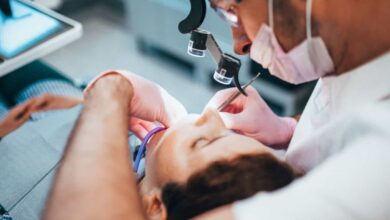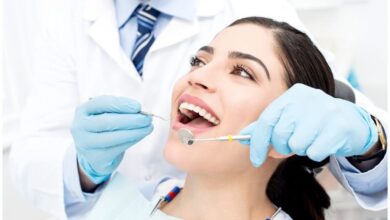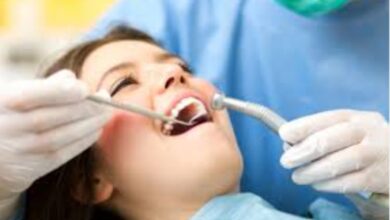Finding the Best Emergency Dentist in Edmonton: Your Guide to Immediate Dental Care

Understanding Emergency Dentist Services
Types of Dental Emergencies
So, what exactly counts as a dental emergency? It’s more than just a little toothache. We’re talking about situations that need immediate attention to stop bleeding, ease severe pain, or save a tooth. In these cases, seeing an emergency dentist in Edmonton as soon as possible can make all the difference. Here’s a quick rundown:
- Severe Toothache: A toothache that just won’t quit and is causing you serious pain. This could point to an infection or something worse.
- Knocked-Out Tooth: If a tooth gets knocked out, time is of the essence. The sooner you get to a dentist, the better the chance of saving the tooth.
- Abscess: A painful, pus-filled bump in your mouth. Abscesses can be serious and need immediate treatment to prevent the infection from spreading.
- Broken or Cracked Tooth: Big breaks or cracks can be super painful and expose the inside of your tooth to infection.
- Lost Filling or Crown: While not always an emergency, losing a filling or crown can cause pain and sensitivity, and it leaves your tooth vulnerable.
When to Seek Immediate Care
Knowing when to head to an emergency dentist can save you a lot of pain and trouble. Don’t wait if you’re experiencing any of these:
- Uncontrolled bleeding in your mouth.
- Severe pain that can’t be managed with over-the-counter pain relievers.
- Trauma to the face or mouth that involves teeth.
- Swelling that’s making it hard to breathe or swallow.
- A fever along with dental pain, which could indicate a serious infection.
What to Expect During Your Visit
Okay, so you’ve decided you need to see an emergency dentist. What happens next? Here’s a general idea:
- Assessment: The dentist will ask about your symptoms and examine your mouth to figure out what’s going on.
- Diagnosis: They might take X-rays to get a better look at the problem.
- Treatment: Depending on the issue, treatment could range from pain relief and antibiotics to a root canal or extraction.
- Aftercare Instructions: You’ll get instructions on how to care for your mouth after the treatment to ensure proper healing.
Emergency dental visits are all about addressing the immediate problem. The dentist will focus on relieving your pain and preventing further damage. Follow-up appointments with your regular dentist might be needed for more extensive treatment.
Choosing the Right Emergency Dentist in Edmonton
Factors to Consider
Finding the right emergency dentist can feel overwhelming, especially when you’re in pain. But taking a little time to consider a few things can make a big difference. Here’s what I think about:
- Response Time: How quickly can they see you? A clinic that can get you in fast is super important.
- Range of Services: Do they handle all types of emergencies? You want a place that can deal with whatever you’re facing.
- Technology: Do they use modern equipment? Up-to-date tech can mean faster, more accurate treatment.
It’s easy to panic when you have a dental emergency. But remember, a little research can help you find a dentist who will provide the best possible care and get you back to feeling like yourself again.
Importance of Qualifications
Of course, you want to make sure the dentist is qualified! Look for a dentist with the right credentials and experience. It’s also worth checking if they have any specific training in emergency dental care. Don’t be afraid to ask about their background and experience. Many practices also offer family dentistry in Edmonton, so you can establish a long-term relationship.
Patient Reviews and Testimonials
What are other people saying? Online reviews can give you a good sense of what to expect. Look for patterns in the reviews. Are people consistently praising their bedside manner? Are there repeated complaints about long wait times? Take everything with a grain of salt, but reviews can be a helpful tool. Also, check for testimonials on the dentist’s website. These can provide more in-depth stories about patient experiences.
Accessibility and Location of Dental Clinics
Proximity to Your Home
When you’re dealing with a dental emergency, the last thing you want is a long drive. Think about how close the dental clinic is to your place, or maybe your work. A clinic that’s easy to get to can really reduce stress when you’re in pain and just want to get it over with. Also, consider traffic patterns at different times of the day. A clinic might look close on the map, but rush hour could turn a 15-minute trip into a 45-minute ordeal.
Availability of 24/7 Services
Dental emergencies don’t always happen during regular business hours. Finding a clinic that’s open 24/7 can be a lifesaver. Some things to consider:
- Around-the-clock availability: Does the clinic really offer 24/7 service, or is it just an answering service that connects you to someone the next day?
- Response time: How quickly can you expect to be seen if you need immediate care in the middle of the night?
- Weekend and holiday hours: Are they truly open every day of the year?
Multiple Locations Across Edmonton
Having a dental clinic with multiple locations in Edmonton can be super convenient. Here’s why:
- Flexibility: If your regular dentist is booked, another location might have an opening.
- Accessibility: No matter where you are in the city, there’s likely a location nearby.
- Consistency of care: You can usually expect the same level of service and quality across all locations.
It’s easy to overlook the importance of location and availability when you’re not in pain. But trust me, when you’re dealing with a throbbing toothache at 2 AM, you’ll be incredibly grateful for a clinic that’s nearby and open.
Cost and Payment Options for Emergency Care
It’s no secret that emergency dental care can be a bit of a financial surprise. But don’t let the potential cost keep you from getting the help you need. Let’s break down the payment side of things so you know what to expect.
Understanding Dental Insurance
Dental insurance can be a lifesaver, but it’s important to know what your plan covers before an emergency hits. Policies vary a lot, so take some time to read the fine print. Here’s what to look for:
- Coverage levels: Some plans cover a large chunk of emergency costs, while others might only cover a small percentage.
- Deductibles: How much do you have to pay out-of-pocket before your insurance kicks in?
- Waiting periods: Some policies have waiting periods before certain procedures are covered, which could be a problem if you need immediate care.
It’s always a good idea to call your insurance provider directly. Ask them specifically about emergency dental coverage, deductibles, and any waiting periods that might apply. Knowing this information ahead of time can save you a lot of stress and unexpected bills.
Flexible Payment Plans
Not everyone has dental insurance, and even those who do might face out-of-pocket expenses. That’s where flexible payment plans come in. Many dental clinics offer options to help you spread out the cost of treatment. Here are a few common ones:
- Payment installments: Breaking the total cost into smaller, more manageable monthly payments.
- Third-party financing: Some clinics partner with financing companies that offer loans for dental work.
- In-house payment plans: Some dentists offer their own payment plans directly to patients.
Affordable Care Options
Finding affordable emergency dental care is possible, you just need to know where to look. Here are a few strategies to consider:
- Community dental clinics: These clinics often offer lower-cost care, sometimes on a sliding scale based on income.
- Dental schools: Dental schools often have clinics where students provide treatment under the supervision of experienced dentists, usually at reduced rates.
- Government programs: Check if there are any government-funded dental programs in Edmonton that you might qualify for.
Preparing for a Dental Emergency
It’s easy to think dental emergencies only happen to other people, but being prepared can make a huge difference. It’s like having a first-aid kit for your teeth! Here’s how to get ready:
Creating a Dental Emergency Kit
Putting together a small kit specifically for dental emergencies is a smart move. Keep it in an easy-to-reach place. Here’s what I’d include:
- Pain relievers: Over-the-counter stuff like ibuprofen or acetaminophen can help manage pain while you’re waiting to see a dentist.
- Gauze: Useful for controlling bleeding after an injury or extraction.
- Small container with a lid: If a tooth gets knocked out, you’ll need something to put it in (preferably milk or saline solution).
- Dental wax: Can provide temporary relief if you have a broken or chipped tooth with sharp edges.
- Saline solution: Good for rinsing your mouth to keep the area clean.
Knowing Emergency Contacts
Having a list of important phone numbers handy can save precious time. Make sure you have:
- Your regular dentist’s number.
- The number of a 24/7 emergency dental clinic in Edmonton.
- Your insurance provider’s contact information.
- A reliable friend or family member who can help you if you’re unable to handle the situation yourself.
Tips for Immediate Care
Knowing what to do right away can minimize damage and improve the chances of a good outcome. Here are a few quick tips:
- Knocked-out tooth: Gently rinse the tooth (don’t scrub it!), and try to put it back in the socket. If that’s not possible, keep it moist in milk or saline solution and get to a dentist ASAP.
- Toothache: Rinse your mouth with warm water and floss gently to remove any food particles. If the pain is severe, take a pain reliever.
- Broken tooth: Rinse your mouth with warm water and apply a cold compress to your face to reduce swelling. Use dental wax to cover any sharp edges.
Being prepared for a dental emergency isn’t just about having the right supplies; it’s about knowing what to do and who to call. A little planning can go a long way in protecting your oral health and reducing stress during a potentially scary situation.
Aftercare Following Emergency Treatment
Follow-Up Appointments
So, you’ve just been through an emergency dental procedure. What’s next? Well, a follow-up appointment is usually scheduled. It’s pretty important. This lets your dentist check how things are healing and make sure there aren’t any complications popping up. They’ll take a look at the treated area, maybe take some X-rays, and just generally confirm that everything is on the right track. Don’t skip these appointments; they’re a key part of getting back to normal.
Managing Pain and Discomfort
Okay, let’s be real – after emergency dental work, there’s likely to be some pain. It’s normal. Your dentist will probably give you instructions on how to handle it. This might include:
- Over-the-counter pain relievers: Things like ibuprofen or acetaminophen can often do the trick.
- Prescription pain meds: For more intense pain, your dentist might prescribe something stronger.
- Cold compresses: Applying ice packs to your face can help reduce swelling and numb the area.
- Saltwater rinses: Gently rinsing with warm salt water can keep the area clean and promote healing.
Preventive Measures for Future Emergencies
No one wants to go through another dental emergency, right? Here are some things you can do to lower your chances of needing urgent care again:
- Brush and floss regularly: This is the most basic, but also the most important. Aim for twice a day brushing and daily flossing.
- Wear a mouthguard: If you play sports, protect your teeth with a custom-fitted mouthguard.
- See your dentist for regular check-ups: Catching problems early can prevent them from turning into emergencies.
- Avoid chewing on hard things: Ice, hard candy, and even pens can crack or chip your teeth.
After emergency dental treatment, it’s easy to think the hard part is over. But proper aftercare is super important for a smooth recovery. Follow your dentist’s instructions closely, and don’t hesitate to reach out if you have any concerns. Taking care of your mouth now can save you from more pain and problems down the road.
Common Myths About Emergency Dentists
Misconceptions About Cost
One big worry people have is that emergency dental care will cost a fortune. It’s true that it can be more expensive than a regular check-up, especially if it’s after hours or on a weekend. But, ignoring a dental problem can lead to bigger, pricier issues down the road. Plus, many clinics offer payment plans or work with insurance to make things more manageable. Don’t let the fear of cost keep you from getting the help you need.
Who Can Provide Emergency Care
There’s a common idea that only dentists who specifically advertise as “emergency dentists” can handle urgent situations. While some practices specialize in emergency care, many general dentists are fully capable of treating dental emergencies. It’s more about the dentist’s experience and willingness to see you quickly than a specific label. If you have a regular dentist, it’s always worth calling them first.
Emergency Care vs. Regular Dental Visits
Some people think emergency dental visits are a replacement for regular check-ups. Nope! Emergency care focuses on immediate problems like pain, infections, or injuries. Regular dental visits are all about prevention – catching problems early, cleaning your teeth, and making sure everything is healthy. Think of it like this: emergency care is the ambulance, and regular visits are the routine doctor appointments that keep you healthy in the first place.
It’s easy to fall into the trap of thinking that if you aren’t in pain, your teeth are fine. But many dental problems develop slowly and silently. Regular check-ups are key to catching these issues before they turn into emergencies. Don’t wait for a crisis to take care of your teeth!




